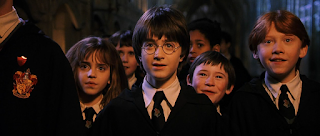Score; RogertEbert.com
Genre; Adventure, fantasy, drama
Director; Chris Columbus
Cast; Daniel Readcliff, emma watson, Alan Rickman
Language; English British
Release; december,19,2001
Score; 8.5/10
'Harry Potter and the Sorcerer's Stone" is a red-blooded adventure movie, dripping with atmosphere, filled with the gruesome and the sublime, and surprisingly faithful to the novel. A lot of things could have gone wrong, and none of them have: Chris Columbus' movie is an enchanting classic that does full justice to a story that was a daunting challenge. The novel by J.K. Rowling was muscular and vivid, and the danger was that the movie would make things too cute and cuddly. It doesn't. Like an "Indiana Jones" for younger viewers, it tells a rip-roaring tale of supernatural adventure, where colorful and eccentric characters alternate with scary stuff like a three-headed dog, a pit of tendrils known as the Devil's Snare and a two-faced immortal who drinks unicorn blood. Scary, yes, but not too scary--just scary enough.
Three high-spirited, clear-eyed kids populate the center of the movie. Daniel Radcliffe plays Harry Potter, he with the round glasses, and like all of the young characters he looks much as I imagined him, but a little older. He once played David Copperfield on the BBC, and whether Harry will be the hero of his own life in this story is much in doubt at the beginning.
Deposited as a foundling on a suburban doorstep, Harry is raised by his aunt and uncle as a poor relation, then summoned by a blizzard of letters to become a student at Hogwarts School, an Oxbridge for magicians. Our first glimpse of Hogwarts sets the tone for the movie's special effects. Although computers can make anything look realistic, too much realism would be the wrong choice for "Harry Potter," which is a story in which everything, including the sets and locations, should look a little made up. The school, rising on ominous Gothic battlements from a moonlit lake, looks about as real as Xanadu in "Citizen Kane," and its corridors, cellars and great hall, although in some cases making use of real buildings, continue the feeling of an atmospheric book illustration. At Hogwarts, Harry makes two friends and an enemy. The friends are Hermione Granger (Emma Watson), whose merry face and tangled curls give Harry nudges in the direction of lightening up a little, and Ron Weasley (Rupert Grint), all pluck, luck and untamed talents. The enemy is Draco Malfoy (Tom Felton), who will do anything, and plenty besides, to be sure his house places first at the end of the year.
This opens up a parallel universe to Harry where the magical is everyday life. This begins with the school's groundskeeper, Hagrid. Robbie Coltrane plays this hulking gentle giant as a naif, fond of weird creatures and loyal in his heart but forever letting school secrets slip despite the best of intentions.
Richard Harris lends graceful sagacity to headmaster Albus Dumbledore, while Maggie Smith is no-nonsense professor McGonagall (though looking too much like the Wicked Witch of the West). Alan Rickman gets the right edge of haughty arrogance for potions professor Snape, but soft-peddles the anger that marked the book's character. As his counterpart, the stuttering Quirrell, instructor in the defenses against the dark arts, Ian Hart performs in the overanxious, hesitant manner we later learn is a ruse.
In striving to include nearly every major episode from the book, Columbus' movie clocks in at over 2-1/2 hours. While this may create problems for parents of restless youngsters, the greater problem is this: Harry Potter feels like a movie in which its makers are afraid to make a single creative move. Rowling's book is Holy Writ. No liberties are allowed. Consequently, the film, while slavishly faithful, contains little innovative juice outside of its visual richness.
On U.K. soundstages, designer Stuart Craig and cinematographer John Seale establish a dark and intricately detailed Hogwarts. Portraits on walls come alive, prankish ghosts float through corridors and interiors always seem in motion, shifting with the castle's moods and whims. The midair games of Quidditch have been reduced from two to one for the movie version. But seeing it makes all the difference as the wild and woolly sport feels like a giant pinball game in the sky.
Then how was Harry's struggle during his magic education at Hogwarts school? please see in full through the link next to this Harry Potter & The Philosopher Stone.













0 komentar:
Posting Komentar